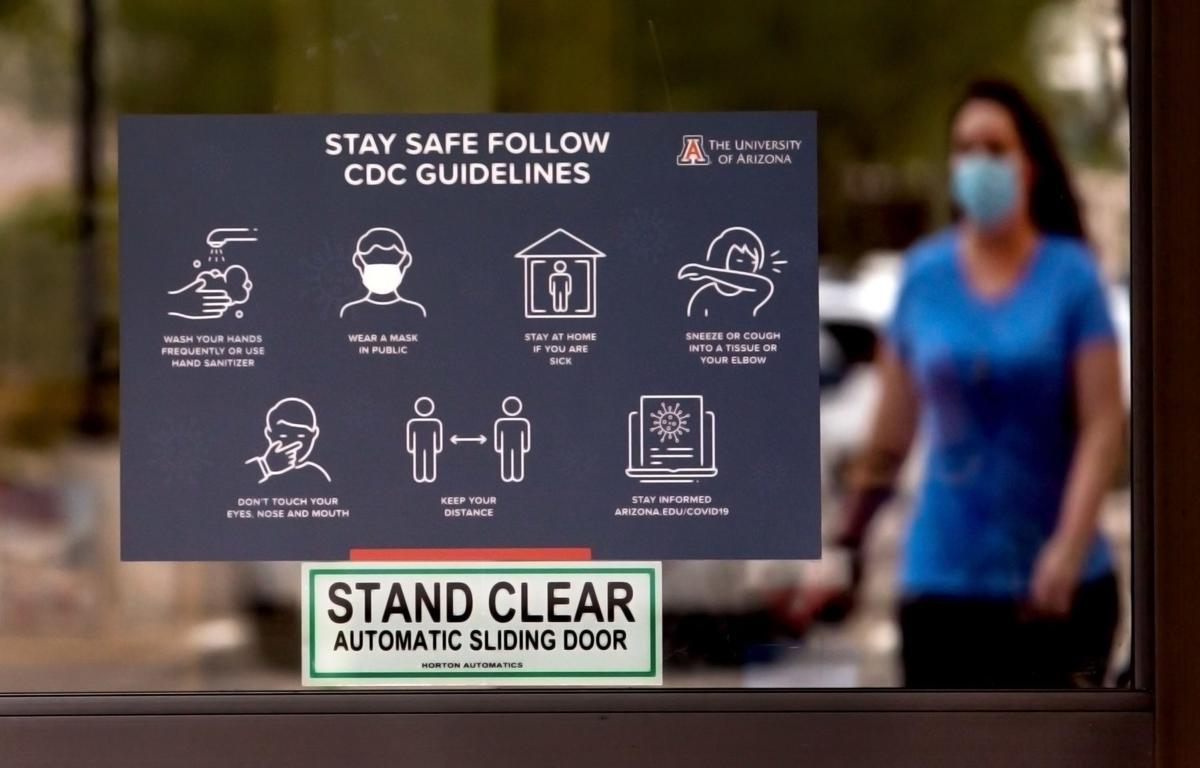As the University of Arizona heads toward the fall semester in less than a month, there are health concerns among employees about returning to campus amid the coronavirus pandemic.
More than 6,000 people are now working around campus during the week as the school prepares to start in-person classes Aug. 24. That number is expected to grow as offices prepare for the influx of students in the weeks ahead.
Health safety measures have been put in place to guard against the spread of COVID-19, and to address concerns of those asked to come back, according to the UA. Those measures include: mask-wearing, enhanced cleaning procedures, and increased airflows in buildings.
But that hasn’t stopped cases from occurring, according to the administration.
“Although we have seen an increase in positive cases reported among employees and students on campus, in alignment with the clear community spread reported by the state, I am pleased that to date we have not had any evidence of the disease spreading within our workplaces, from one Wildcat to another,” Provost Liesl Folks wrote in an email to the UA community.
The university said privacy policies prevent it from releasing further information about cases affecting the UA community.
Some employees, including those within the Coalition for Academic Justice — a group of 500 faculty members, staff workers and graduate students — continue to voice concerns about returning to campus. The coalition’s recent results of a survey of 1,279 employees showed 67% are uncomfortable returning to their physical workplaces.
“More than 95% of those who felt uncomfortable with a return worried about the risk of getting COVID-19 or spreading it to others,” the coalition said. “Some noted that staff face greater risks than faculty because they have less flexibility to decide where they will do their work.”
Measures urged by the coalition include: complete and accurate data and projections from expert sources, including pandemic experts; and a plan that incorporates understanding of COVID-19’s impact on minorities and lower income people.
“Why now?”
Some employees at the UA Foundation, the school’s nonprofit fundraising organization, have concerns for their safety, too, after receiving a notice about returning to work in person.
On June 23, an email from foundation President John-Paul Roczniak to employees said there would be a measured return to offices. He did note in the letter that “we haven’t just maintained, we’ve worked harder than ever to engage donors in new ways and secure their support for new priorities.”
This plan to return to offices was for all central members of the University Alumni and Development Program, which consists of the university’s Alumni Association as well as the foundation. The organizations support UA operations but remain independent nonprofit organizations.
“Since March, a core group pitched in to keep routine business flowing, and I want to thank all of them,” Roczniak said. “However, as of July 6, teams will need to reassume their duties, working with their managers to coordinate coverage of in-office tasks.”
The message came days before Gov. Doug Ducey told residents they’re “safer at home” and closed bars, gyms, and other places for another 30 days. During this time, Arizona was labeled a hot spot for positive cases.
A foundation employee, who spoke to the Star on the condition of anonymity, highlighted the “Return to the Workplace Decision Tree” published by the UA’s Human Resources Department as one of the concerns about the foundation’s direction.
“University HR issued a decision tree, which said in the first question ‘Can your employees continue to accomplish their work remotely or the majority of their work remotely?’ If the answer to that is yes, then have them continue to work remotely,’” the employee said about the HR guidelines.
“The question a lot of us were asking is why now?” the employee said about the request to return.
The foundation did say only those without a medical condition or disability or concerns related to other risk factors were asked to work with managers to determine if they would come back.
Those who meet these criteria of staying away from their offices will continue their duties remotely.
The foundation stated plainly that a part of its reasoning is its operations will work better.
“Fundraising work is built on strong relationships, and a key component of our organizational culture is maintaining those relationships among and across teams. We believe in the power of human connection and interaction, with distanced and masked interactions surpassing screen-mediated ones in terms of quality and meaning,” the statement said.
In the weeks since employees returned, the foundation said it has worked to utilize spaces to house workers safely.
“We are currently staffed at no more than 30% of any of our three buildings’ occupancies — respectively, those numbers are 38, 19, and 7 people. Those individuals are in most cases spread out over multiple floors and working in private offices,” the foundation said.
The employee noted that precautions taken at the work sites include: cleaning and sanitizer, social distancing, masking, as well as Plexiglas barriers and one-way traffic flows to monitor entering and exiting.
However, that is with a limited number of staff workers present, the employee said. The foundation will attempt to raise the occupancy limits to 50% in coming months.
“With every additional body you put in the space, you’re driving up the risk of transmission,” the foundation employee said.
“You can be taking all the precautions, but someone is still having to assume a certain amount of personal risk just by leaving their house and commuting to work.”





